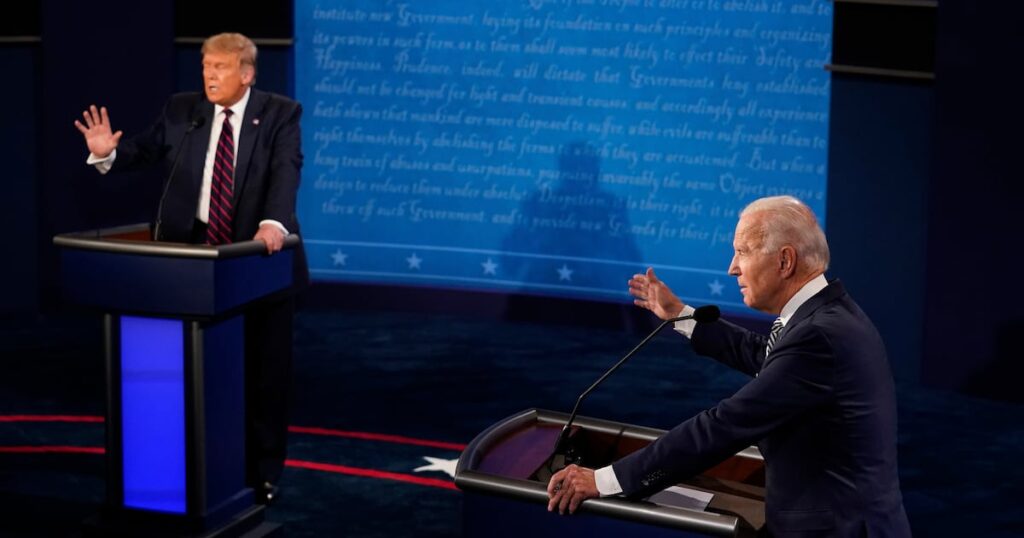What’s the point of having a live audience at a debate?
On October 5, 1988, during a televised debate between vice presidential candidates, then-Texas Sen. Lloyd Bentsen made harsh remarks toward Indiana Sen. Dan Quayle.
Mr. Quayle, a Republican, had just claimed that he had as much experience in Congress as former President John F. Kennedy before moving to the White House. Bensen replied: “Senator, I served under Jack Kennedy. I knew Jack Kennedy. Jack Kennedy was a friend of mine. Senator, you are not Jack Kennedy.”
At the Civic Auditorium in Omaha, Nebraska, many in the audience erupted into long and enthusiastic applause.
But imagine Bentsen's famous line without an audience. No applause. No energy from supporters. Extraneous rebuttals (Quayle was comparing his years of service, not his accomplishments, after all) were just thrown into an empty hall.
Do you remember?
Did it really matter in informing voters' decisions about the most important political office in this country?
Utahns are understandably disappointed that the Commission on Presidential Debates event scheduled for the University of Utah on Oct. 9 likely won't take place. The presidential debates may have been permanently altered, but probably not for the better, as the two leading candidates came up with their own schedules.
With one exception, that is. President Joe Biden and former President Donald Trump appear to have agreed to a debate without an audience.
An even better idea is to turn off the candidate's microphone when it's not their turn to speak. (This is actually being discussed.)
And there's an even better way than this. Place candidates in separate studios.
There is precedent for the last issue. The third debate between Kennedy and Richard Nixon took place on October 9, 1960, with Nixon in Los Angeles and Kennedy in New York.
But the 1960 debate was conducted with a sense of decorum, seriousness, and overall adult behavior that is rarely seen in America today. Neither candidate dared interfere with the other's arguments. After all, the children were watching.
In my lifetime, we've gone from there to Biden's “Will you just shut up?” In 2020.
At presidential debates, moderators regularly warn audience members to remain silent. Most of the time they comply. But as Chris Silitza wrote on CNN in 2020, if people have to be silent, why are they there?
“It's like going to a sporting event and being told not to cheer or talk to anyone,” he wrote. “What's the point?”
So I'm wholeheartedly in favor of letting them stay home with everyone else.
But the mostly silent audience isn't the biggest problem. It's all a rude intrusion.
The Biden campaign has called for microphones to be shut off. As someone who has moderated several debates, I too have wished for something like that. But I don't think both sides will agree to that.
But more importantly, as we enter this new realm of political debate, Americans should mourn the apparent demise of the debate commission. Voters suffer when political parties and candidates collude to decide the moderators and participants, and when a neutral third party does not set and enforce the rules.
Robert F. Kennedy Jr. may be a polarizing figure, but a Fox News poll gives him an approval rating of 11%, and the New York Times says he's one of the best third-party candidates in recent decades. It reported that it had better support, winning about 10% in key battleground states. .
Why should candidates who are potentially major spoilers be excluded from events where voters can apply pressure to examine them, their beliefs, and their answers? And, on the other hand, why would a candidate who could be hurt by such a candidate agree to let him attend? Obviously someone other than the candidate has to set the rules.
After all, Americans deserve an electoral process commensurate with the dignity and seriousness of their administration. Without a doubt, we lost this.
Four years ago, a reporter for Britain's Guardian newspaper said of one of that year's presidential debates: People's lives will be shaped by the actions of the next president. ”
That is hardly the image of government we should present to the American people, much less to the world.
The goal should be to return presidential debates to substantive discussion. Although there have been some good steps, there is little reason to believe we are getting any closer.



